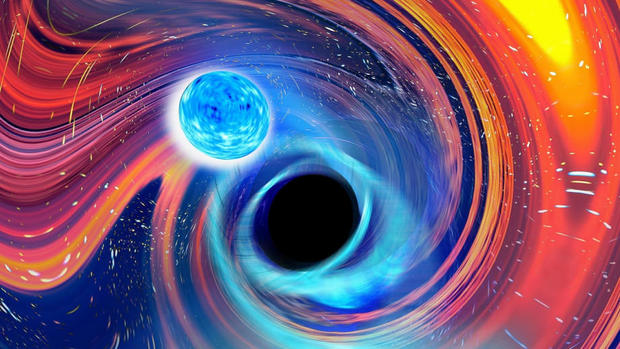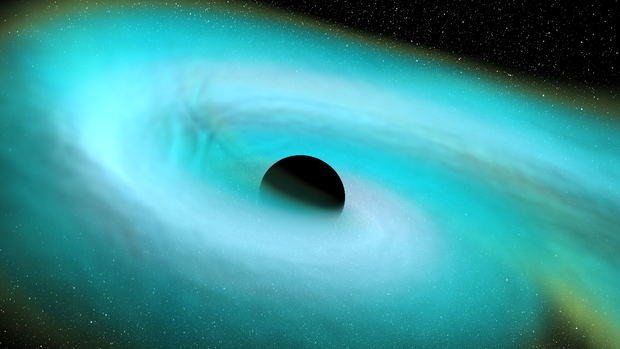In what looks like a celestial version of "Pac-Man," scientists have detected black holes gobbling up neutron stars — marking the observation of collisions between the two most extreme objects in the universe for the very first time.
And the hefty feasts occurred one billion years ago.
Within a 10-day time frame, a team of over 1,000 international scientists spotted the rare cosmic event twice using the Laser Interferometer Gravitational-Wave Observatory in the U.S. and the Virgo gravitational-wave observatory in Italy, They published their findings, originally documented in January 2020, on Tuesday in The Astrophysical Journal Letters.
While researchers have suspected this type of event in the past, this is the first time one has been confirmed. Ecstatic researchers say the observations of the death spiral and merger of neutron stars and black holes will help "unlock some of the most complex mysteries of the universe," including the building blocks of matter and the nature of the space-time continuum.
Co-author Susan Scott said that, although the collisions occurred about a billion years ago, they were so massive that their gravitational waves — ripples in space-time that shake the entire universe — have only just finished traveling at least 900 million light years to reach Earth.
"These collisions have shaken the universe to its core and we've detected the ripples they have sent hurtling through the cosmos," she said in a statement Wednesday. "Each collision isn't just the coming together of two massive and dense objects. It's really like Pac-Man, with a black hole swallowing its companion neutron star whole."
Ahead of the collision and merger, the two massive objects, both the corpses of massive dead stars, orbit each other at around half the speed of light. During the newly-captured collision, the neutron star is warped and deformed as it nears the black hole, which becomes more massive as it swallows the star whole.
In one instance, a black hole with a mass nine times that of our sun swallowed up a neutron star with a mass around twice that of the sun. The other event involved a black hole with a mass about six times bigger than the sun snacking on a neutron star about 1.5 times the sun's mass.
All of the mass of a neutron star is squeezed into an extremely dense star, which is about the size of a city. Scientists say that one teaspoon of a neutron star weighs as much as all of humanity.
Astronomers searched the sky for flashes of light that may have resulted from the events, but none were found, possibly due to their distance from Earth. Additionally, the black holes in these cases were large enough to swallow the entirety of the neutron stars, leaving behind no light to detect.
"These were not events where the black holes munched on the neutron stars like the cookie monster and flung bits and pieces about," said co-author Patrick Brady. "That 'flinging about' is what would produce light, and we don't think that happened in these cases."
Scientists have previously captured two black holes smashing together and the collision of two neutron stars — but they "have waiting a very long time" to witness the two come together.
"Now, we've completed the last piece of the puzzle with the first confirmed observations of gravitational waves from a black hole and a neutron star colliding," Scott said.
Astronomers have spent decades hunting for this sort of event in the Milky Way galaxy, but have yet to find any.
"With this new discovery of neutron star-black hole mergers outside our galaxy, we have found the missing type of binary," co-author Astrid Lamberts said. "We can finally begin to understand how many of these systems exist, how often they merge, and why we have not yet seen examples in the Milky Way."
"These kind of detections are incredibly rare," said co-author Johannes Eichholz. "We haven't detected these events once — but twice and within 10 days of each other. "Like the ripples from these two events, which have been felt a billion years later, these findings will have a profound impact on our understanding of the universe for many years to come."
https://news.google.com/__i/rss/rd/articles/CBMiWmh0dHBzOi8vd3d3LmNic25ld3MuY29tL25ld3MvcGFjbWFuLWFzdHJvbm9tZXItYmxhY2staG9sZS1uZXV0cm9uLXN0YXItY29sbGlzaW9uLXVuaXZlcnNlL9IBXmh0dHBzOi8vd3d3LmNic25ld3MuY29tL2FtcC9uZXdzL3BhY21hbi1hc3Ryb25vbWVyLWJsYWNrLWhvbGUtbmV1dHJvbi1zdGFyLWNvbGxpc2lvbi11bml2ZXJzZS8?oc=5
2021-06-30 12:13:35Z
52781702716610


Tidak ada komentar:
Posting Komentar